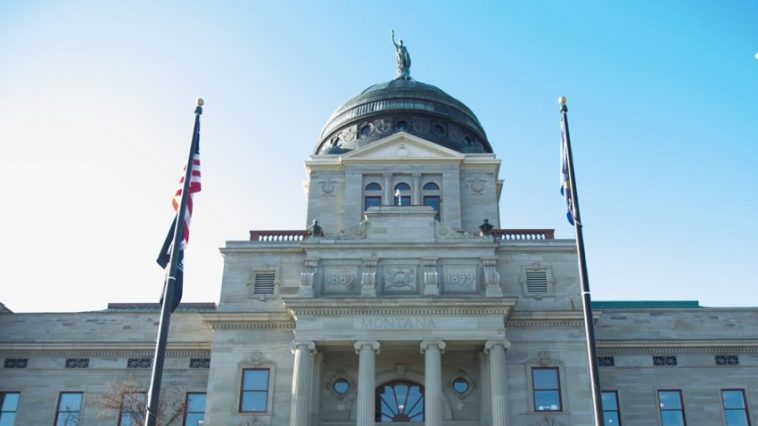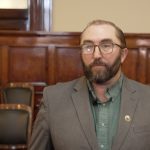Missoula, MT – Since losing her home, Chloe Carlson’s life has been confined to a tent. The four walls of her temporary shelter, pitched on a slight incline to avoid flooding, are her only protection from the elements. As winter storms hit, Carlson relies on the warmth of her two cats to survive the cold, making do with what little she has. Despite the hardships, Carlson has learned how to navigate the challenges of homelessness, finding solace in the snow, which, she says, often brings warmer temperatures due to the clouds trapping daytime heat.
Carlson’s journey into homelessness began in 2022 when she lost her job at a restaurant in West Yellowstone. After returning to her mother’s home in Missoula, she quickly realized that the environment was no longer a safe refuge. Her mother’s struggles with mental illness and substance abuse created an inhospitable space, ultimately leading Carlson to leave and live on the streets. It was then that Carlson’s journey into homelessness shifted from silent suffering to active survival.
For over a year, Carlson stayed in a shelter but left after experiencing a series of negative encounters. In the face of adversity, Carlson found her voice. She has since become an activist, not only for the unhoused population in Missoula but also for the transgender community, a cause she says is essential to her survival.
“I didn’t choose to become an activist. It’s a matter of survival, really,” Carlson explains. “It’s not because I want to do it—I’d rather not have to.”
Montana’s homelessness crisis is not unique to Carlson. The state’s homelessness rate has surged by 89% from 2007 to 2023, the second-largest increase in the nation, according to a report from the Montana Coalition to Solve Homelessness. In response to this growing crisis, lawmakers have begun to explore legislative solutions aimed at addressing the visible signs of homelessness, with some proposing measures that would give local governments more power to regulate urban camping.
One such proposal, introduced by Rep. Greg Overstreet, R-Stevensville, seeks to modify state law to allow cities to pass ordinances that would ban camping in urban areas. The move has sparked heated debate, with supporters arguing it would give cities more control over their local issues, while opponents contend that the approach may not effectively address the root causes of homelessness.
Overstreet’s trio of bills—House Bill 208, House Bill 642, and HB 905—are among the most notable pieces of legislation being discussed. HB 208 would allow local governments to regulate camping and garbage collection on public property, while HB 642 would define urban camping as a public nuisance and impose fines of up to $500 per day. Both bills have passed through House and Senate committees and are awaiting a full Senate vote. However, HB 905, which would have tied property tax deductions for owners if cities failed to enforce these ordinances, was recently shelved in a Senate committee.
Overstreet argues that these bills are part of a broader, multi-faceted strategy to address homelessness. While he acknowledges the difficulties homeless individuals face, he emphasizes that cities must have the tools to regulate behavior in public spaces.
“The status quo, merely providing social services and ignoring law enforcement, isn’t working,” Overstreet states. “I’m not trying to criminalize homelessness. I’m trying to give municipalities tools to control it before it becomes a bigger problem.”
Jennifer Olson, a representative from the Montana League of Cities and Towns, supports HB 208, emphasizing that local governments should have the authority to tailor their approaches to the specific challenges their communities face. The 2024 U.S. Supreme Court ruling in Grants Pass v. Johnson grants municipalities more leeway to pass regulations against urban camping, provided there are shelters for those in need.
“We need this option to help regulate our cities,” Olson says. “Each city is unique, and it’s important for us to have the flexibility to address what works best in our communities.”
While the legislative approach is one step toward solving the homelessness issue in Montana, questions remain about whether these measures will truly improve conditions for those like Carlson. Critics argue that such policies may fail to address the underlying causes of homelessness, including lack of affordable housing, mental illness, and addiction, instead focusing solely on managing the visible symptoms of the crisis.
For Carlson, the struggle is personal. Her fight for survival continues, and while she’s found purpose in her advocacy work, her day-to-day reality remains precarious. As lawmakers debate the future of urban camping ordinances and local regulation, one thing remains clear: the fight against homelessness in Montana is far from over, and solutions must go beyond legislation if they are to make a real difference in the lives of those who need it most.



